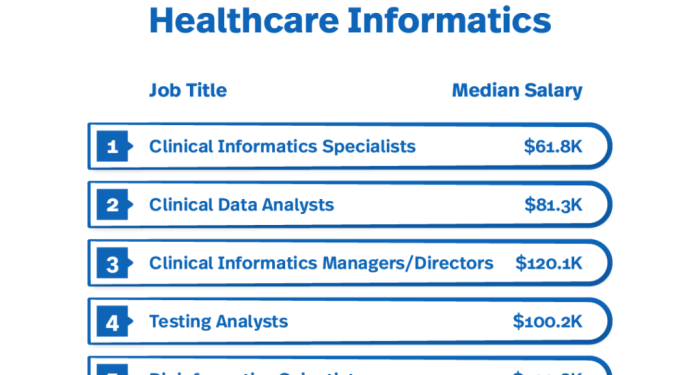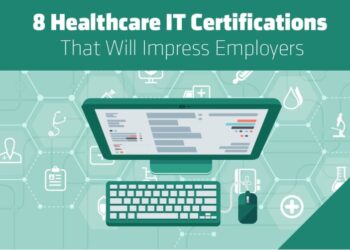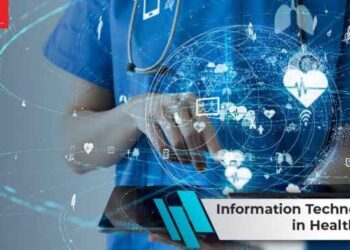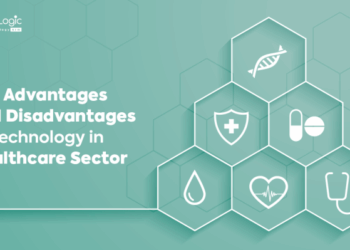Health Information Technology Jobs in High Demand sets the stage for this enthralling narrative, offering readers a glimpse into a story that is rich in detail and brimming with originality. From the essential skills required to the potential career advancements, this guide covers it all with a focus on clarity and insight.
Overview of Health Information Technology Jobs
Health Information Technology (HIT) professionals play a crucial role in the healthcare industry by managing and organizing electronic health records (EHRs), ensuring data accuracy, privacy, and security, and implementing technology solutions to improve patient care.
The importance of Health Information Technology cannot be overstated, as it helps healthcare providers access crucial patient information quickly, make informed decisions, and streamline processes to deliver efficient and high-quality care.
Various Job Titles and Responsibilities in Health Information Technology
- Health Information Manager: Oversees the maintenance and security of patient records, ensures compliance with regulations, and manages HIT staff.
- Clinical Data Analyst: Analyzes medical data to improve patient outcomes, identify trends, and develop healthcare strategies.
- Health Information Technician: Codes and categorizes patient information for insurance reimbursement, research, and compliance purposes.
- Health Informatics Specialist: Designs, implements, and manages healthcare information systems to optimize data flow and improve patient care delivery.
- Chief Medical Information Officer (CMIO): Collaborates with healthcare professionals to implement technology solutions that enhance patient care and clinical workflows.
Skills Required for Health Information Technology Jobs
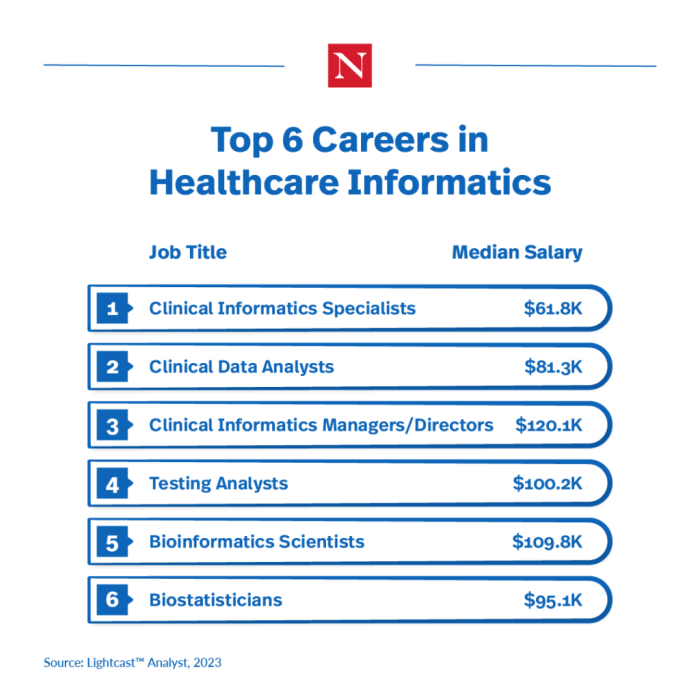
To excel in the field of Health Information Technology, professionals need to possess a unique set of skills that combine technical expertise with strong interpersonal abilities. These skills are essential for effectively managing electronic health records, ensuring data accuracy, and supporting healthcare operations.
Technical Skills
- Proficiency in Health Information Systems: Understanding and working knowledge of electronic health records (EHR) systems, health information exchange (HIE) platforms, and other healthcare databases.
- Data Analysis: Ability to analyze and interpret healthcare data for decision-making, quality improvement, and regulatory compliance.
- Health Information Security: Knowledge of privacy laws, data encryption, and cybersecurity measures to protect patient information.
- IT Proficiency: Familiarity with software applications, databases, and programming languages commonly used in healthcare settings.
Soft Skills
- Communication: Effective communication skills are crucial for collaborating with healthcare providers, explaining technical information to non-technical staff, and interacting with patients.
- Attention to Detail: Precision and accuracy in managing health information to ensure patient safety and compliance with regulations.
- Problem-Solving: Ability to troubleshoot technical issues, identify process improvements, and adapt to changes in healthcare technology.
- Teamwork: Collaboration with interdisciplinary teams, including clinicians, administrators, and IT professionals, to achieve organizational goals.
Educational Requirements and Training
To pursue a career in Health Information Technology, individuals typically need to complete a formal education program. These programs are available at various levels, ranging from certificates to associate's and bachelor's degrees.
Typical Educational Paths
- Certificate Programs: These programs are often suitable for individuals looking to enter the field quickly. They provide fundamental knowledge and skills required for entry-level positions.
- Associate's Degree: An associate's degree in Health Information Technology offers a more in-depth education, covering topics such as medical coding, electronic health records, and healthcare data management.
- Bachelor's Degree: A bachelor's degree provides a comprehensive understanding of Health Information Technology, including advanced topics like healthcare analytics and information systems management.
Certifications and Additional Training
- Registered Health Information Technician (RHIT): Obtaining this certification can enhance job prospects and demonstrate proficiency in the field.
- Certified Health Data Analyst (CHDA): This certification focuses on data analysis skills, which are increasingly valuable in the healthcare industry.
- Additional Training: Professionals can benefit from pursuing specialized training in areas like cybersecurity, healthcare informatics, or electronic health record systems to stay competitive in the field.
Importance of Continuing Education
Continuing education is crucial for Health Information Technology professionals to keep up with the rapidly evolving industry trends. Staying current with advancements in technology, regulations, and best practices ensures that professionals can provide high-quality services and adapt to changes in healthcare delivery systems effectively.
Job Outlook and Growth Opportunities
The field of Health Information Technology is experiencing a surge in demand as healthcare organizations increasingly rely on digital systems to manage patient data efficiently and securely. This has created a promising job market for professionals in this sector.
Current Demand for Health Information Technology Professionals
Healthcare facilities are actively seeking skilled Health Information Technology professionals to help streamline operations, ensure compliance with regulations, and protect patient information
Growth Projections for Jobs in Health Information Technology
According to the Bureau of Labor Statistics, the employment of Health Information Technicians is projected to grow 8% from 2019 to 2029, much faster than the average for all occupations. This growth is attributed to the increasing need for healthcare services and the adoption of electronic health records.
Career Advancement Opportunities
Professionals in Health Information Technology roles have various opportunities for career advancement. They can specialize in areas such as healthcare data analysis, information security, or health informatics. With experience and additional certifications, individuals can progress to roles like Health Information Manager or Chief Information Officer in healthcare organizations.
Work Environment and Settings
In the field of Health Information Technology, professionals work in a variety of settings that play crucial roles in the healthcare industry.
Hospitals
Health Information Technology professionals play a vital role in hospitals by managing patient data, maintaining electronic health records, and ensuring compliance with regulations. They work closely with healthcare providers to ensure accurate and secure documentation of patient information.
Clinics
In clinics, Health Information Technology professionals are responsible for organizing and managing patient records, scheduling appointments, and coding diagnoses and procedures. They play a key role in streamlining administrative processes and improving the overall efficiency of healthcare delivery.
Insurance Companies
Health Information Technology professionals also work in insurance companies, where they analyze and process claims, assess medical necessity, and ensure proper billing practices. Their expertise in health information management is essential for insurance companies to accurately assess and evaluate healthcare claims.
Salary and Compensation
When it comes to Health Information Technology jobs, salary and compensation are essential factors to consider. Professionals in this field can expect competitive pay based on various factors such as experience, education, and location.
Average Salary Range
- The average salary range for Health Information Technology professionals typically falls between $40,000 to $90,000 per year, depending on the specific role and level of experience.
- Entry-level positions may start at around $40,000, while senior-level roles with extensive experience can earn up to $90,000 or more annually.
Factors Influencing Salary Levels
- Education and certifications: Professionals with advanced degrees or specialized certifications may command higher salaries.
- Experience: The number of years working in the field can significantly impact salary levels.
- Location: Salaries can vary based on the cost of living in different regions and states.
- Employer: Working for a large healthcare organization or government agency may offer higher salaries compared to smaller private practices.
Additional Benefits and Perks
- Healthcare benefits: Many employers offer comprehensive health insurance plans for employees and their families.
- R retirement plans: Some companies provide 401(k) matching or pension plans to help employees save for retirement.
- Flexible work arrangements: Telecommuting options or flexible schedules are becoming more common in the field of Health Information Technology.
- Professional development opportunities: Reimbursement for continuing education or training programs can be a valuable perk for career advancement.
Final Wrap-Up
In conclusion, the world of Health Information Technology Jobs in High Demand is a dynamic and rewarding field that offers numerous opportunities for growth and success. With a blend of technical expertise and soft skills, professionals in this industry are well-equipped to make a significant impact on healthcare.
Stay informed, stay engaged, and embrace the possibilities that this high-demand sector has to offer.
FAQ Compilation
What are the typical educational paths to enter the Health Information Technology field?
Common educational paths include obtaining a degree in Health Information Management, Health Informatics, or a related field.
Are there any certifications or additional training that may be beneficial for professionals in this field?
Certifications such as RHIA or RHIT can enhance job prospects, along with additional training in electronic health records systems.
What factors may influence salary levels for Health Information Technology professionals?
Factors such as experience, education, location, and specific job responsibilities can impact salary levels in this field.
What are some examples of additional benefits or perks offered to Health Information Technology professionals?
Additional benefits may include healthcare coverage, retirement plans, flexible work arrangements, and opportunities for professional development.

